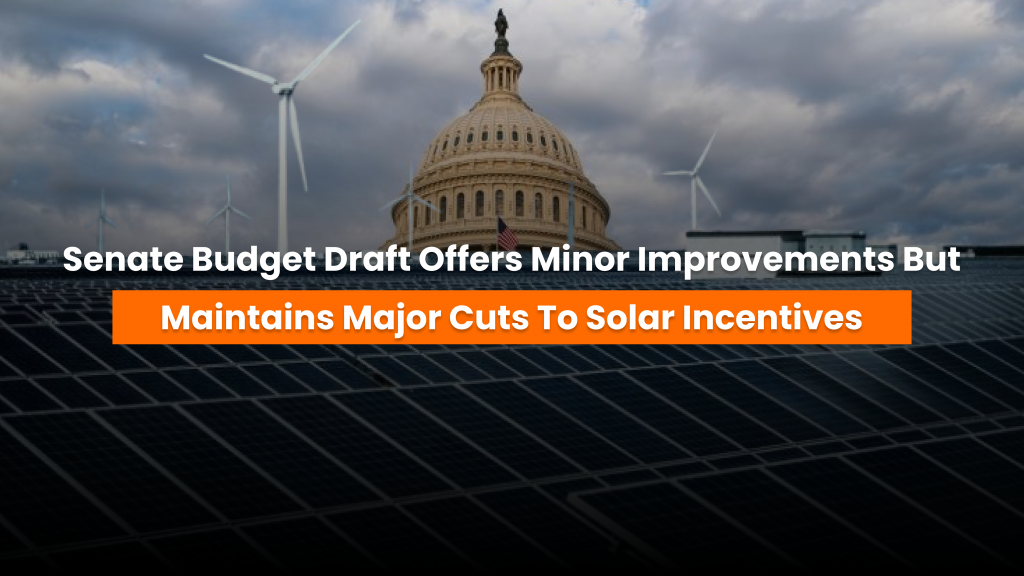The Senate Finance Committee released a draft budget proposal this week that makes only slight improvements to the House-passed reconciliation bill but largely keeps the significant cuts to solar tax incentives intact, industry leaders warned. The legislation, intended to overhaul clean energy funding, continues to pose serious risks to the growth and stability of the U.S. solar market.
According to Solar Power World, the Senate draft preserves key elements that would sharply reduce the residential Investment Tax Credit (ITC), shorten the timeline for clean energy credits, and restrict credit transferability — moves the solar industry says will threaten thousands of jobs and billions of dollars in investment.
The draft, unveiled June 19, offers some limited relief by extending certain phase-out periods and slightly softening language around credit transfers. However, experts argue these changes fall far short of what’s needed to sustain the industry’s momentum.
“While there are minor improvements, the bill still carries major cuts that will devastate solar and storage jobs across the country,” said Abigail Ross Hopper, president and CEO of the Solar Energy Industries Association (SEIA). “This draft bill, as it stands, risks shuttering factories, slowing deployment, and raising costs for American families.”
Industry analysis cited by Solar Power World reveals that under the proposed Senate draft, approximately 330,000 current and future solar and storage jobs remain at risk nationwide. Texas, one of the fastest-growing solar markets, could lose over 34,000 jobs by 2030 alone, threatening a network of panel manufacturers, inverter producers, and mounting system suppliers that have expanded under current policies.
The bill would also affect community solar programs, rooftop installations, and energy storage projects, potentially stalling progress toward national clean energy goals and undermining the Inflation Reduction Act’s impact on domestic manufacturing.
“States like California, Florida, and Illinois will face severe job losses if the Senate doesn’t act to improve these incentives,” Hopper added. “We urge Senate leaders to work with stakeholders to protect American jobs and the investments made possible by the IRA.”
The Senate’s draft follows the House of Representatives’ earlier approval of the reconciliation package with sweeping cuts that the solar industry has strongly opposed. Industry advocates have pushed for a “scalpel, not sledgehammer” approach that targets reforms carefully without jeopardizing critical incentives that have driven historic solar growth.
Solar Power World reports that the Senate Finance Committee plans to move forward with a markup session before the July Fourth recess, leaving only a narrow window for amendments and negotiations.
Meanwhile, coalitions representing solar manufacturers, installers, and clean energy advocates continue to rally support for preserving the ITC and related credits. Public polling cited by these groups shows broad bipartisan support for maintaining the tax incentives through at least 2032, with many Americans concerned about rising energy costs and climate impacts.
Despite pressure from some Republican lawmakers advocating for rapid phase-outs of the credits, including restrictions designed to favor domestic supply chains, industry leaders warn that abrupt policy shifts could stall growth and lead to higher utility bills nationwide.
“Any approach that abruptly cuts solar incentives will threaten energy security and economic resilience,” said Hopper. “The Senate has a responsibility to ensure a responsible transition that balances fiscal concerns with long-term clean energy leadership.”
With the Senate’s Finance Committee set to finalize its version of the budget reconciliation bill in the coming weeks, all eyes are on Capitol Hill as stakeholders await critical decisions that will shape the future of the U.S. solar industry.
The fate of hundreds of thousands of American jobs, billions in clean energy investment, and the nation’s climate goals hinge on whether the Senate can craft legislation that protects the gains made under the Inflation Reduction Act while responsibly managing budget priorities.




